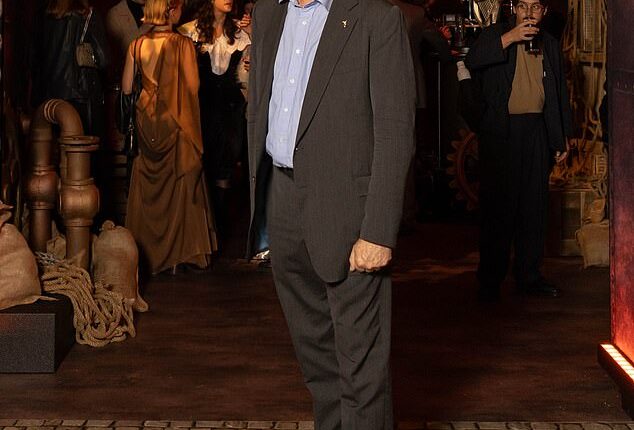The Guinness brewing dynasty may be worth millions of pounds – but the family has been plagued by rumours of a ‘curse’ ever since the 1700s.
However, the current head of the House – Edward ‘Ned’ Guinness, the 4th Earl of Iveagh – has finally put an end to the myth once and for all, telling The Telegraph this weekend that it is ‘made up’.
The Earl, 56, who is the owner of the Elveden Estate in Suffolk and is worth £856million according to this year’s Sunday Times Rich List, is the great-great-great-great-great-grandson of original Guinness founder, Arthur.
The family has long been associated with a history of startling misfortune and scandal, from a scandalous marriage between Nazi sympathisers Diana and Oswald Mosley to armed robberies and a certain number of suspicious deaths.
And last month, the story was brought to a global audience for a new production with Netflix, titled House Of Guinness, starring the likes of James Norton and Louis Partridge and from Peaky Blinders creator Steven Knight – though it later sparked backlash from communities in Ireland.
Speaking to the Telegraph in the wake of the show’s release, Ned said that the idea of a ‘curse’ is simply ‘dreamt up.’
‘You could say we’re the luckiest family alive. I feel blessed by being a Guinness, not cursed,’ he added.
He joked: ‘I’m not involved in the business. I carry the passport, and they carry the beer onwards.’

Edward ‘Ned’ Guinness, the 4th Earl of Iveagh, has said the family’s curse is ‘dreamt up’ (pictured at the premiere of Netflix’s House Of Guinness last month)
Ned himself manages the Elveden Estate in Suffolk and is a trustee for the Iveagh Trust in Dublin, a social housing provider he established in 1980.
He was also a member of the House of Lords as a crossbencher from 1996 until 1999, when he was among the hereditary peers to be removed by the House of Lords Act that year.
And despite no longer owning the Guinness brand, which sits under the Diageo drinks company, the family has still maintained its wealth.
Ned, who is the son of Sir Arthur Francis Benjamin Guinness, told the paper: ‘I’m an earl, but what does that mean? I was privileged to be in the Lords and my sons won’t be – that’s a direction of travel, and that will be how good or challenged individuals make it.’
The Guinness ‘curse’ is said to have began with original founder Arthur, who in 1759 used his £100 inheritance left to him by his godfather to establish the business at St James’s Gate in Dublin.
He famously signed a 9,000 year lease for the brewery – clearly supremely confident that the family business would be a roaring success. The annual rent was fixed at £45.
But despite establishing years of wealth and prosperity for his descendants, his personal life was marred by tragedy.
He fathered 21 children – but 10 of them died before him. Though this was not uncommon at the time, it was still a devastating tragedy for the businessman, and signalled the strife to come for the family.
The years that followed saw scandal being brought into the family through the marriage between Diana Guinness (born Mitford) and Oswald Mosley.

Netflix’s latest hit House Of Guinness sparked furious backlash just days after it launched on the streaming giant. Anthony Boyle and Louis Partridge are pictured in the show
Diana was a Mitford girl, who married into the Guinness family with her first husband Bryan Guinness, 2nd Baron Moyne, as they were both part of the social set ‘The Bright Young Things’.
But, after meeting at a garden party in 1932, Diana, who was born 17 June 1910 and died 11 August 2003, and Mosley, who was born 16 November 1896 and died 3 December 1980, embarked on an affair.
The former was still married to her first husband Bryan Guinness, heir to the brewing fortune, and the latter was wed to Lady Cynthia Curzon, a daughter of Lord Curzon.
Mosley, founder and leader of the British Union of Fascists from 1932, wouldn’t divorce his wife for Diana, but in 1933, Cynthia died of peritonitis.
Diana gave up all of society – she had been one of its darlings as a beautiful, newly married, rich young woman – when she left her first husband for Mosley.
Diana’s behaviour scandalised her family and they refused to support her choice to leave Bryan for Mosley, with the sister becoming briefly estranged.
She arguably become the ‘most hated woman in England for a while’, before marrying Mosley in a secret ceremony in Nazi Germany in 1936 in Joseph Goebbels’ drawing room.
For many, Lord Moyne, Walter Edward Guinness, marks the true start of the curse.
He served as the British minister of state in the Middle East until November 1944, when he was assassinated by the terror group the Stern Gang in Cairo.

Lady Mary Charteris, Daphne Guinness, Edward Guinness, Ivana Lowell, Jasmine Guinness, Celeste Guinness are pictured at the premiere last month
Then, in 1978, Lady Henrietta Guinness jumped off the the Ponte delle Torri bridge in Umbria, Italy, after suffering life-changing injuries in a car crash years previously.
London-based socialite and Guinness heir Tara Browne was the driver of a Lotus Elan when it smashed into another car in South Kensington in December 1966.
Browne died of his injuries two hours later, aged just 21.
Tragedy struck yet again in 2020, when the family’s 19-year-old heiress Honor Uloth was found unconscious at a pool in Chichester Harbour in Sussex.
The most recent tragedy is that of Henry Channon, who passed away in 2021 aged 51 from an ‘unspecified illness’.
Henry – the grandson or Sir Henry ‘Chips’ Cannon – was a publisher in London and a member of the Guinness dynasty.
Friends said that Channon had battled with an illness for several months before his death.
After the release of the Netflix show last week, Daphne Guinness, 57, the daughter of Lord Moyne and granddaughter of the late Diana Mitford, also told how bearing the famous name has proved to be somewhat bittersweet, describing it as a ‘paradox’ and a ‘blessing and a curse’.
The heiress, who was a muse to the late designer Karl Lagerfeld, explained that, although she was given opportunities that others of a different background might not have had, her surname led people to believe things about her that aren’t necessarily true.
It’s a reality that Daphne, now a fashion designer and musician, has grappled with since her childhood, and it shows no signs of slowing down following the release of the new series, which is set in the 19th century and tells the story of the Irish family behind the world-famous stout.

Critics in Ireland said James Norton’s accent was ‘jarring’, while another called him ‘steampunk Mr Tayto’
Talking to Grazia, Daphne explained: ‘It made people assume things that weren’t necessarily true. It was rather annoying to have to break away from that name and to become someone in your own right.
‘I’m not complaining, because everyone has to come from somewhere. People like Bowie or McQueen, they wouldn’t have worked with me if I wasn’t good at what I did. It can open a door, but then it’s what you do after you open that door.’
The programme itself sparked furious backlash in Ireland just days after it was released.
The saga – which Netflix explains in the opening is ‘inspired by true stories’ – came under fire for its ‘cliched’ portrayal of Irish history, ‘jarring’ attempts by British actors at an Irish accent, and an ‘invented’ gay storyline.
The show accompanied its period drama setting with a modern soundtrack, including Irish punk band Fontaines D.C and controversial Irish rappers Kneecap, whose Glastonbury performance was not streamed live by the BBC after one of the members was charged with a terror offence.
Liam Og O hAnnaidh, who performs under the stage name Mo Chara, has denied the charge and it has since been thrown out following a technical error in the way the charge was brought.
Even one of the family’s descendants, writer Molly Guinness, said she felt a ‘righteous’ fury while watching the show and was left in disbelief at how bosses had chosen to portray her late ancestors.
Writing in The Times, Molly said she grew ‘more and more indignant’ while watching the show, which she said turned ‘my great-great grandfather Edward and his brother Arthur… into knaves and fools’.
She said the show’s portrayal of Sir Benjamin implied he was cruel to his children, but, in reality, he was a ‘loving father’.
The writer, who grew up in Wiltshire, also alleged that Arthur’s ‘gay exploits’ had been ‘invented’, while the love stories of Anne and Edward were ‘inappropriate’.
In Ireland, where the show is set, House Of Guinness sparked controversy for its dramatised portrayal of Irish history – as well as the British actors’ accents.
Writers in the Irish Star said James Norton’s accent as Irishman Sean Rafferty was more similar to ‘Darby O’Gill’ than 1800s Dublin.
They said: ‘Five episodes in, there’s one thing that keeps pulling me away from the action – James Norton’s accent.
‘While he’s not the only English actor in the series, his accent is the most jarring.
‘As an Irish person whose job involves watching TV and movies, some attempts at Irish accents haunt my dreams – and not in a good way.’
Meanwhile Ed Power, reviewing in The Irish Times, said that show creator Steven Knight showed his ‘understanding of Ireland under colonialism is rudimentary’, and lamented that the show was filmed in Liverpool not the Emerald Isle.
Though it was supposed to be Netflix’s answer to Succession, he noted that there were ‘many negatives’ in the ‘wildly unfaithful retelling’, in which most of the Irish characters seemed ‘the same’.









